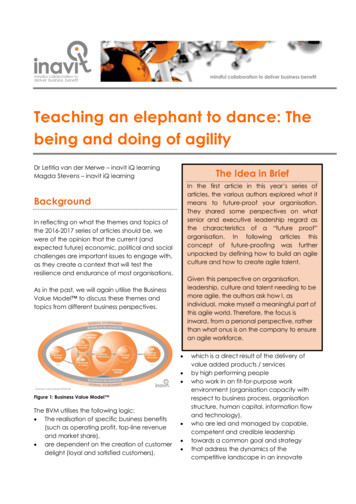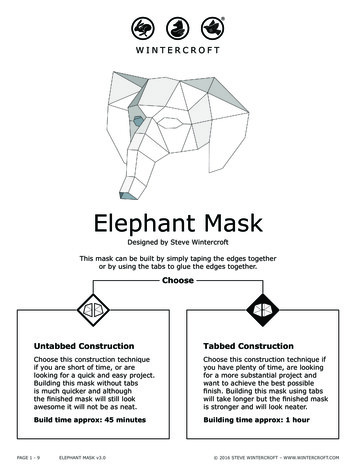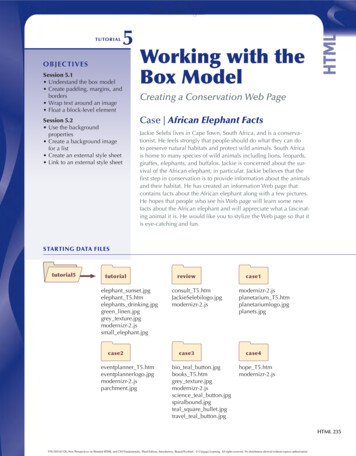
Transcription
Acclaim for HARUKI MURAKAMI’STHE ELEPHANT VANISHES“Charming, humorous and frequently puzzling The Elephant Vanishes [is] fun to read. “— The New York Times“These stories show us Japan as it’s experienced from the inside . [They] take place in parallelworlds not so much remote from ordinary life as hidden within its surfaces . Even in the slipperiestof Mr. Murakami’s stories, pinpoints of detail flash out warm with life, hopelessly — andwonderfully — unstable.”— The New York Times Book Review“A stunning writer at work in an era of international literature.”— Newsday“Murakami is one of the great Japanese masters, and his style is sexy, funny, mysterious, and alwayscoolly deadpan.”— Details“Enchanting intriguing all of these tales have a wonderfully surreal quality and a hip, wittytone. Mr. Murakami has pulled off a tricky feat, writing stories about people who are bored but neverboring. He left me lying awake at night, hungry for more.”— Wall Street Journal“What’s unique to Murakami’s stories is that they manage to kindle up all sorts of feelings at once .Reading The Elephant Vanishes leaves you wanting more.”— Philadelphia Inquirer“The Elephant Vanishes , through [its] bold originality and charming surrealism, should win theauthor new readers in this country.”— Detroit Free Press
CONTENTSTHE WIND-UP BIRD AND TUESDAY’S WOMENTHE SECOND BAKERY ATTACKTHE KANGAROO COMMUNIQUÉON SEEING THE 100% PERFECT GIRL ONE BEAUTIFUL APRIL MORNINGSLEEPTHE FALL OF THE ROMAN EMPIRE,THE 1881 INDIAN UPRISING, HITLER’S INVASION OF POLAND, AND THE REALM OF RAGING WINDSLEDERHOSENBARN BURNINGTHE LITTLE GREEN MONSTERFAMILY AFFAIRA WINDOWTV PEOPLEA SLOW BOAT TO CHINATHE DANCING DWARFTHE LAST LAWN OF THE AFTERNOONTHE SILENCETHE ELEPHANT VANISHESABOUT THE AUTHOROTHER BOOKS BY THIS AUTHORALSO BY HARUKI MURAKAMI
Icooking spaghetti when the woman calls. Another moment until the spaghetti is done; thereI am, whistling the prelude to Rossini’s La Gazza Ladra along with the FM radio. Perfect spaghetticooking music.I hear the telephone ring but tell myself, Ignore it. Let the spaghetti finish cooking. It’s almost done,and besides, Claudio Abbado and the London Symphony Orchestra are coming to a crescendo. Still,on second thought, I figure I might as well turn down the flame and head into the living room, cookingchopsticks in hand, to pick up the receiver. It might be a friend, it occurs to me, possibly with word ofa new job.“I want ten minutes of your time,” comes a woman’s voice out of the blue.“Excuse me?” I blurt back in surprise. “How’s that again?”“I said, just ten minutes of your time, that’s all I want,” the woman repeats.I have absolutely no recollection of ever hearing this woman’s voice before. And I pride myself ona near-perfect ear for voices, so I’m sure there’s no mistake. This is the voice of a woman I don’tknow. A soft, low, nondescript voice.“Pardon me, but what number might you have been calling?” I put on my most polite language.“What difference does that make? All I want is ten minutes of your time. Ten minutes to come to anunderstanding.” She cinches the matter quick and neat.“Come to an understanding?”“Of our feelings,” says the woman succinctly.I crane my neck back through the door I’ve left open to peer into the kitchen. A plume of whitesteam rising cheerfully from the spaghetti pot, and Abbado is still conducting his Gazza.“If you don’t mind, I’ve got spaghetti on right now. It’s almost done, and it’ll be ruined if I talk withyou for ten minutes. So I’m going to hang up, all right?”“Spaghetti?” the woman sputters in disbelief. “It’s only ten-thirty in the morning. What are youdoing cooking spaghetti at ten-thirty in the morning? Kind of strange, don’t you think?”“Strange or not, what’s it to you?” I say. “I hardly had any breakfast, so I was getting hungry rightabout now. And as long as I do the cooking, when and what I eat is my own business, is it not?”“Well, whatever you say. Hang up, then,” says the woman in a slow, sappy trickle of a voice. Apeculiar voice. The slightest emotional shift and her tone switches to another frequency. “I’ll callback later.”“Now, wait just one minute,” I stammer. “If you’re selling something, you can forget right nowabout calling back. I’m unemployed at present and can’t afford to buy anything.”“I know that, so don’t give it another thought,” says the woman.“You know that? You know what?”“That you’re unemployed, of course. That much I knew. So cook your spaghetti and let’s get onwith it, okay?”“Hey, who the—” I launch forth, when suddenly the phone goes dead. Cut me off. Too abruptly tohave set down the receiver; she must have pressed the button with her finger.I’m left hanging. I stare blankly at the receiver in my hand and only then remember the spaghetti. Iput down the receiver and return to the kitchen. Turn off the gas, empty the spaghetti into a colander,’M IN THE KITCHEN
top it with tomato sauce I’ve heated in a saucepan, then eat. It’s overcooked, thanks to that pointlesstelephone call. No matter of life-and-death, nor am I in any mood to fuss over the subtleties ofcooking spaghetti—I’m too hungry. I simply listen to the radio playing send-off music for two hundredfifty grams of spaghetti as I eagerly dispatch every last strand to my stomach.I wash up plate and pans while boiling a kettle of water, then pour a cup for a tea bag. As I drinkmy tea, I think about that phone call.So we could come to an understanding?What on earth did that woman mean, calling me up like that? And who on earth was she?The whole thing is a mystery. I can’t recall any woman ever telephoning me before withoutidentifying herself, nor do I have the slightest clue what she could have wanted to talk about.What the hell, I tell myself, what do I care about understanding some strange woman’s feelings,anyway? What possible good could come of it? What matters now is that I find a job. Then I can settleinto a new life cycle.Yet even as I return to the sofa to resume the Len Deighton novel I took out of the library, the mereglimpse out of the corner of my eye of the telephone sets my mind going. Just what were thosefeelings that would take ten minutes to come to an understanding about? I mean, really, ten minutes tocome to an understanding of our feelings?Come to think of it, the woman specified precisely ten minutes right from the start. Seems she wasquite certain about that exact amount of time. As if nine minutes would have been too short, elevenminutes maybe too long. Just like for spaghetti al dente.What with these thoughts running through my head, I lose track of the plot of the novel. So I decideto do a few quick exercises, perhaps iron a shirt or two. Whenever things get in a muddle, I alwaysiron shirts. A habit of long standing with me.I divide the shirt-ironing process into twelve steps total: from (1) Collar Front , to (12) Cuff Left Sleeve . Absolutely no deviation from that order. One by one, I count off the steps. The ironingdoesn’t go right if I don’t.So there I am, ironing my third shirt, enjoying the hiss of the steam iron and the distinctive smell ofhot cotton, checking for wrinkles before hanging up each shirt in the wardrobe. I switch off the ironand put it away in the closet with the ironing board.I’m getting thirsty by now and am heading to the kitchen for some water when once more thetelephone rings. Here we go again, I think. And for a moment I wonder whether I shouldn’t just ignoreit and keep on going into the kitchen. But you never know, so I retrace my steps back to the livingroom and pick up the receiver. If it’s that woman again, I’ll say I’m in the middle of ironing and hangup.The call, however, is from my wife. By the clock atop the TV, it’s eleven-thirty.“How’re things?” she asks.“Fine,” I answer, relieved.“What’ve you been up to?”“Ironing.”“Is anything wrong?” my wife asks. A slight tension invades her voice. She knows all about myironing when I’m unsettled.
“Nothing at all. I just felt like ironing some shirts. No particular reason,” I say, switching thereceiver from right hand to left as I sit down on a chair. “So, is there something you wanted to tell meabout?”“Yes, it’s about work. There’s the possibility of a job.”“Uh-huh,” I say.“Can you write poetry?”“Poetry?” I shoot back in surprise. What’s this about poetry?“A magazine company where someone I know works puts out this popular fiction monthly for younggirls and they’re looking for someone to select and brush up poetry submissions. Then they want oneleadoff poem each month for the section. The work’s easy and the pay’s not bad. Of course it’s onlypart-time, but if things go well they might string you on for editorial work and—”“Easy?” I say. “Now hold on just one minute. I’ve been looking for a position with a law firm. Justwhere do you come up with this brushing up of poetry?”“Well, didn’t you say you used to do some writing in high school?”“In a newspaper. The high-school newspaper. Such-and-such team won the soccer meet; thephysics teacher fell down the stairs and had to go to the hospital. Dumb little articles like that I wrote.Not poetry. I can’t write poetry.”“Not real poetry, just the kind of poems high-school girls might read. They don’t even have to bethat good. It’s not like they’re expecting you to write like Allen Ginsberg. Just whatever you can makedo.”“I absolutely cannot write make-do poetry,” I snap. The very idea.“Hmph,” pouts my wife. “This talk of legal work, though. Nothing seems to be materializing, doesit?”“Several prospects have come my way already. The final word’ll be in sometime this week. Ifthose fall through, maybe then I’ll consider it.”“Oh? Have it your way, then. But say, what day is it today?”“Tuesday,” I tell her after a moment’s thought.“Okay, then, could you stop by the bank and pay the gas and phone bills?”“Sure thing. I was going out to shop for dinner soon, anyway. I can take care of it at the same time.”“And what are we having for dinner?”“Hmm, let’s see,” I say. “Haven’t made up my mind yet. I thought I’d decide when I go shopping.”“You know,” my wife starts in with a new tone of voice, “I’ve been thinking. Maybe you don’treally need to be looking for work.”“And why not?” I spit out. Yet more surprises? Is every woman in the world out to shake me upover the phone? “Why don’t I have to be looking for work? Another three months and myunemployment compensation is due to run out. No time for idle hands.”“My salary’s gone up, and my side job is going well, not to mention we have plenty in savings. Soif we don’t go overboard on luxuries, we should be able to keep food on the table.”“And I’d do the housework?”
“Is that so bad?”“I don’t know,” I say in all honesty. I really don’t know. “I’ll have to think it over.”“Do think it over,” reiterates my wife. “Oh, and by the way, has the cat come back?”“The cat?” I’m caught off guard, then I realize I’d completely forgotten about the cat all morning.“No, doesn’t seem so.”“Could you scout around the neighborhood a bit? He’s been gone four days now.”I give some spur-of-the-moment reply, switching the receiver back to my right hand.“My guess is that the cat’s probably in the yard of that vacant house at the end of the passage. Theyard with the stone bird figurine. I’ve seen him there often enough. You know where I’m talkingabout?”“No, I’m afraid I don’t,” I say. “And since when have you been snooping around in the passage onyour own? Never once have you mentioned—”“You’ll have to forgive me, but I’ve got to hang up. Have to be getting back to work. Don’t forgetabout the cat, now.”And the telephone cuts off.I sit there looking dumbly at the receiver a second before setting it down.Now why would my wife know so much about the passage? I can’t figure it out. She’d have toclimb over a high cinder-block wall to get there from our yard, and what possible reason was there togo to all that trouble to begin with?I go to the kitchen for that drink of water, turn on the FM radio, and trim my nails. They’re doing afeature on Robert Plant’s new album. I listen to two songs before my ears start to hurt and I switch thething off. I go out to the porch to check the cat’s food dish; the dried fish I put in the previous nighthasn’t been touched. Guess the cat really hasn’t come back.Standing there on the porch, I look at the bright spring sun slicing down into our tiny yard. Hardlythe sort of yard that lingers fondly in the mind. The sun hits here only the briefest part of the day, sothe soil is always dark and damp. Not much growing: just a couple of unremarkable hydrangeas. AndI’m not terribly crazy about hydrangeas in the first place.From a nearby stand of trees comes the periodic scree-ee-eech of a bird, sharp as a tighteningspring. The “wind-up bird,” we call it. My wife’s name for it. I have no idea what it’s really called.Nor even what it looks like. Nonetheless, this wind-up bird is there every morning in the trees of theneighborhood to wind things up. Us, our quiet little world, everything.As I listen to the wind-up bird, I’m thinking, Why on earth is it up to me to go searching after thatcat? And more to the point, even if I do chance to find it, what am I supposed to do then? Drag the cathome and lecture it? Plead with it—Listen, you’ve had everyone worried sick, so why don’t youcome home?Great, I think. Just great. What’s wrong with letting a cat go where it wants to go and do what itwants to do? Here I am, thirty years old, and what am I doing? Washing clothes, planning dinnermenus, chasing after cats.Not so long ago, I’m thinking, I was your regular sort of guy. Fired up with ambition. In highschool, I read Clarence Darrow’s autobiography and decided to become a lawyer. My grades weren’tbad. And in my senior year I was voted by my classmates runner-up “Most Likely to Succeed.” I even
got accepted into the law department of a comparatively reputable university. So where had Iscrewed up?I plant my elbows on the kitchen table, prop up my chin, and think: When the hell did the compassneedle get out of whack and lead my life astray? It’s more than I can figure. There’s nothing I canreally put my finger on. No setbacks from student politics, no disillusionment with university, neverreally had much girl trouble. As near as I can tell, I’ve had a perfectly normal existence. Yet one day,when it came time for me to be graduating, I suddenly realized I wasn’t the same guy I used to be.Probably, the seed of a schism had been there all along, however microscopic. But in time the gapwidened, eventually taking me out of sight of who I was supposed to be. In terms of the solar system,if you will, I should by now have reached somewhere between Saturn and Uranus. A little bit fartherand I ought to be seeing Pluto. And beyond that—let’s see—was there anything after that?At the beginning of February, I quit my longtime job at the law firm. And for no particular reason. Itwasn’t that I was fed up with the work. Granted, it wasn’t what you could call an especially thrillingjob, but the pay wasn’t bad and the atmosphere around the office was friendly enough.My role at the firm was, in a word, that of full-time office boy.Although I still believe I did a good job of it, by my standards. Strange as it may sound comingfrom my own mouth, I find I’m really very capable when it comes to carrying out immediate tasksaround the office like that. I catch on quickly, operate methodically, think practically, don’t complain.That’s why, when I told the senior partner I wanted to quit, the old man—the father half of this “——and Son, Attorneys at Law”—even offered to raise my salary if I’d just stay on.But stay on I didn’t. I don’t exactly know why I up and quit. Didn’t even have any clear goals orprospects of what to do after quitting. The idea of holing up somewhere and cramming for one moreshot at the bar exam was too intimidating. And besides, I didn’t even especially want to become alawyer at that point.When I came out and told my wife over dinner I was thinking of quitting my job, all she said was“Fair enough.” Just what that “Fair enough” was supposed to mean, I couldn’t tell. But that was theextent of it; she didn’t volunteer a word more.When I then said nothing, she spoke up. “If you feel like quitting, why don’t you quit? It’s your life,you should do with it as you like.” She’d said her piece and was straightaway deboning the fish onher plate with her chopsticks.My wife does office work at a design school and really doesn’t do badly, salarywise. Sometimesshe gets illustration assignments from editor friends, and not for unreasonable pay, either. I, on mypart, was eligible for six months’ unemployment compensation. So if I stayed home and did thehousework regularly every day, we could even swing a few expenses like eating out and dry cleaning,and our life-style wouldn’t change all that much from when I was working and getting a salary.So it was I quit my job.AI go out shopping as usual, a large canvas carryall slung over my shoulder. First I stop bythe bank to pay the gas and telephone bills, then I shop for dinner at the supermarket, then I have acheeseburger and coffee at McDonald’s.I return home and am putting the groceries away in the refrigerator when the telephone rings. Itsounds positively irritated, the way it rings. I leave a half-opened plastic tub of tofu on the table, headT TWELVE-THIRTY
into the living room, and pick up the receiver.“Finished with your spaghetti?” It’s that woman again.“Yeah, I’m done,” I say. “But now I have to go out looking for the cat.”“Can’t that wait ten minutes? Looking for the cat!”“Well, ten minutes, maybe.”What the hell am I doing?, I think. Why am I obliged to spend ten minutes passing the time of daywith some strange woman?“Now, then, perhaps we can come to an understanding,” says the woman, nice and quiet. From thesound of it, this woman—whoever she is—is settling back into a chair there on the other end of theline, crossing her legs.“Hmm, I don’t know about that,” I say. “Some people, ten years together and they still can’tunderstand each other.”“Care to try?” the woman teases.I undo my wristwatch and switch on the stopwatch mode, then press the timer’s start button.“Why me?” I ask. “Why not ring up somebody else?”“I have my reasons,” the woman enunciates slowly, as if measuredly masticating a morsel of food.“I’ve heard all about you.”“When? Where?”“Sometime, somewhere,” the woman says. “But what does that matter? The important thing is now.Right? What’s more, talking about it only loses us time. It’s not as if I had all the time in the world,you know.”“Give me some proof, then. Proof that you know me.”“For instance.”“How about my age?”“Thirty,” the woman answers on the spot. “Thirty and two months. Good enough?”That shuts me up. The woman really does know me. Yet no matter how I rack my brains, I can’tplace her voice. I simply couldn’t have forgotten or confused someone’s voice. Faces, names—maybe—but voices, never.“Well, now, it’s your turn to see what you can tell about me,” she says suggestively. “What do youimagine from my voice? What kind of woman am I? Can you picture me? This sort of thing’s yourforte, isn’t it?”“You got me,” I say.“Go ahead, try,” the woman insists.I glance at my watch. Not quite a minute and a half so far. I heave a sigh of resignation. Seems I’vealready taken her up, and once the challenge is on, there’s no turning back. I used to have a knack forguessing games.“Late twenties, university graduate, native Tokyoite, upper-middle-class upbringing,” I fire away.“Amazing,” says the woman, flicking a cigarette lighter by the receiver. A Cartier, by the sound ofit. “Keep going.”
“Fairly good-looking. At least, you yourself think so. But you’ve got a complex. You’re too short oryour breasts are too small or something like that.”“Pretty close,” the woman giggles.“You’re married. But all’s not as smooth as it could be. There are problems. No woman withouther share of problems would call up a man and not give her name. Yet I don’t know you. At least I’venever talked with you before. This much imagined, I still can’t picture you.”“Oh, really?” says the woman in a hush calculated to drive a soft wedge into my skull. “How canyou be so sure of yourself? Mightn’t you have a fatal blind spot somewhere? If not, don’t you thinkyou’d have pulled yourself a little more together by now? Someone with your brains and talent.”“You put great stock in me,” I say. “I don’t know who you are, but I should tell you I’m not thewonderful human being you make me out to be. I don’t seem to be able to get things done. All I do ishead off down detour after detour.”“Still, I used to have a thing for you. A long time ago, that is.”“A long time ago, you say,” I prompt.Two minutes fifty-three seconds.“Not so very long ago. We’re not talking history.”“Yes, we are talking history,” I say.Blind spot, eh? Well, perhaps the woman does have a point. Somewhere, in my head, in my body,in my very existence, it’s as if there were some long-lost subterranean element that’s been skewingmy life ever so slightly off.No, not even that. Not slightly off—way off. Irretrievably.“I’m in bed right now,” the woman says. “I just took a shower and have nothing on.”That does it, I think. Nothing on? A regular porno tape this is getting to be.“Or would you rather I put on panties? How about stockings? Do they turn you on?”“Anything’s fine. Do what you like,” I say. “But if you don’t mind, I’m not that kind of a guy, not forthis sort of stuff over the telephone.”“Ten minutes, that’s all. A mere ten minutes. That’s not such a fatal loss, is it? I’m not asking foranything more. That much is plain goodwill. But whatever, just answer the question. Do you want menaked? Or should I put something on? I’ve got all kinds of things, you know. Garter belts and ”Garter belts? I must be going crazy. What woman has garter belts in this day and age? Models forPenthouse, maybe.“Naked is fine. And you don’t have to move,” I say.Four minutes down.“My pubic hair is still wet,” the woman says. “I didn’t towel it dry. So it’s still wet. Warm and ohso wet.”“Listen, if you don’t mind—”“And down below that, it’s a whole lot warmer. Just like hot buttercream. Oh so very hot. Honest.And what position do you think I’m in right now? I have my knee up and my left leg spread out to theside. It’d be around 10:05 if I were a clock.”
I could tell from the way she said it that she wasn’t making this up. She really did have her legsspread to 10:05, her vagina warm and moistened.“Caress the lips. Gently, slowly. Then open them. Slowly, like that. Now caress them gently withthe sides of your fingers. Oh, yes, slowly slowly. Now let one hand fondle my left breast, fromunderneath, lifting gently, tweaking the nipple just so. Again and again. Until I’m about to come—”I hang up without a word. Then I roll over on the sofa, smoke a cigarette, and gaze up at the ceiling,stopwatch clicked at five minutes twenty-three seconds.I close my eyes and darkness descends, a darkness painted blind with colors.What is it? Why can’t everyone just leave me in peace?Not ten minutes later, the telephone rings again, but this time I don’t pick up. Fifteen rings and itstops. I let it die, and all gravity is displaced by a profound silence. The stone-chill silence ofboulders frozen deep into a glacier fifty thousand years ago. Fifteen rings of the telephone have utterlytransformed the quality of the air around me.Atwo o’clock, I climb from my backyard over the cinder-block wall into the passage.Actually, it’s not the corridor you’d expect a passage to be; that’s only what we call it for lack of abetter name. Strictly speaking, it isn’t a corridor at all. A corridor has an entrance and an exit,forming a route from one place to another.But this passage has neither entrance nor exit, and leads smack into a cinder-block wall at one endand a chain link fence at the other. It’s not even an alleyway. For starters, an alley has to at least havean entrance. The neighbors all call it “the passage” for convenience sake.The passage meanders between everyone’s backyards for about six hundred feet. Three-footsomething in width for the most part, but what with all the junk lying around and the occasional hedgecropping in, there are places you can barely squeeze through sideways.From what I’ve heard—this is from a kindly uncle of mine who rents us our house ridiculouslycheap—the passage used to have an entrance and an exit, offering a shortcut across the block, streetto-street. But then, with the postwar boom years, new homes were built in any available space,hemming in the common ground to a narrow path. Which ushered in the none-too-inviting prospect ofhaving strangers walking through backyards, practically under the eaves, so the residentssurreptitiously covered the entrance. At first an innocent little bush barely disguised the opening, buteventually one resident expanded his yard and extended his cinder-block wall to completely seal itover. While the corresponding other aperture was screened off with a chain link fence to keep thedogs out. It hadn’t been the residents who made use of the passage to begin with, so no onecomplained about its being closed at both ends. And anyway, closing it wouldn’t hurt as a crimeprevention measure. Thus, the path went neglected and untrafficked, like some abandoned canal,merely serving as a kind of buffer zone between the houses, the ground overgrown with weeds, stickyspider webs strung everywhere a bug could possibly alight.Now, why should my wife frequent such a place? It was beyond me. Me, I’d only set foot in thepassage one time before. And she can’t even stand spiders.Yet when I try to think, my head’s filled to bursting with some gaseous substance. I didn’t sleepwell last night, plus the weather’s too hot for the beginning of May, plus there was that unnervingtelephone call.LITTLE BEFORE
Oh, well, I think, might as well look for that cat. Leave later developments for later. Anyway, it’s adamn sight better to be out and about than to be cooped up indoors waiting for the telephone to ring.The spring sun cuts clean and crisp through the ceiling of overhanging branches, scattering patchesof shadow across the ground. With no wind, the shadows stay glued in place like fateful stains.Telltale stains sure to cling to the earth as it goes around and around the sun for millennia to come.Shadows flit over my shirt as I pass under the branches, then return to the ground. All is still. Youcan almost hear each blade of grass respiring in the sunlight. A few small clouds float in the sky,vivid and well formed, straight out of a medieval engraving. Everything stands out with such claritythat I feel buoyant, as if somehow my body went on forever. That, and it’s terribly hot.I’m in a T-shirt, thin cotton slacks, and tennis shoes, but already, just walking around, my armpitsand the cleft of my chest are drenched with sweat. I’d only just this morning pulled the T-shirt andslacks out of storage, so every time I take a deep breath there’s this sharp mothball smell, as if sometiny bug had flown up my nose.I keep an eye peeled to both sides and walk at a slow, even pace, stopping from time to time to callthe cat’s name in a stage whisper.The homes that sandwich the passage are of two distinct types and blend together as well as liquidsof two different specific gravities. First there are the houses dating from way back, with bigbackyards; then there are the comparatively newer ones. None of the new houses has any yard tospeak of; some don’t have a single speck of yard space. Scarcely enough room between the eaves andthe passage to hang out two lines of laundry. In some places, clothes actually hang out over thepassage, forcing me to inch past rows of still-dripping towels and shirts. I’m so close I can heartelevisions playing and toilets flushing inside. I even smell curry cooking in one kitchen.The old homes, by contrast, hardly betray a breath of life. Judiciously placed hedges of cypress andother shrubbery guard against inquisitive eyes, although here and there you catch a glimpse of a wellmanicured spread. The houses themselves are of all different architectural styles: traditional Japanesehouses with long hallways, tarnished copper-roofed early Western villas, recently remodeled“modern” homes. Common to all, however, is the absence of any visible occupants. Not a sound, nota hint of life. No noticeable laundry, either.It’s the first time I’ve taken in the sights of the passage at leisure, so everything is new to my eyes.Propped up in a corner of one backyard is a lone, withered, brown Christmas tree. In another yardlies several childhoods’ worth of every plaything imaginable—a virtual scrap heap of tricycle parts,a ringtoss set, plastic samurai swords, rubber balls, a toy turtle, wooden trucks. One yard sports abasketball hoop, another a fine set of garden chairs and a rattan table. By the look of them, the chairshaven’t been sat on in months (maybe years), they’re so covered with dirt; the tabletop is rainplastered with lavender magnolia petals.One house presents a clear view into its living room through large glass sliding doors. There I seea kidney-shaped sofa with matching lounge furniture, a sizable television, a cellarette topped with atank of tropical fish and two trophies of some sort, and a decorator floor lamp. It all looks as unrealas a set for a TV sitcom.In another yard, there’s a massive doghouse penned in with wire screening. No dog inside that I cansee, though. Just a wide-open hole. I also notice that the screening is stretched shapeless, bulging outas if someone or something had been leaning into it for months.
The vacant house my wife told me about is only a little farther along, past the one with thedoghouse. Right away, I can see it’s vacant. One look tells you that this is not your scant two-or threemonths’ absence. The place is a fairly new two-story
of Mr. Murakami’s stories, pinpoints of detail flash out warm with life, hopelessly — and wonderfully — unstable.” — The New York Times Book Review “A stunning writer at work in an era of international literature.” — Newsday “Murakami is one of the great Japanese masters, and his style is sexy, funny, mysterious, and always










